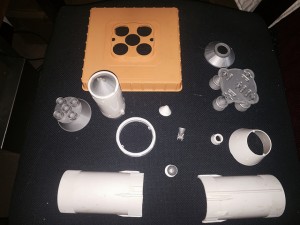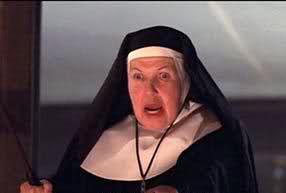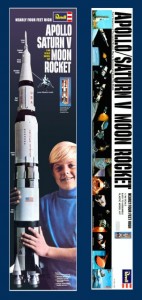
My brother says this isn’t the box art he remembers, but it’s what appears to have been the 1969 release art. Image courtesy of Scalemates
My brother had a model Saturn V rocket. Assembled, I believe it stood about 30 inches tall. I guess he assembled it. I remember yellow streaks of model glue on the… does a rocket have a fuselage? But you could separate it into stages (what good is a rocket if you can’t separate it into stages?) and it was almost always disassembled. It was almost always disassembled because his annoying little brother, who was much too young for such a model, wanted to play with it all the time.
And who wouldn’t want to play with it? It had the Apollo command module and capsule, the capsule just the size of an acorn, but still… It may have had a lunar module on the side. And I’m pretty sure there was a completely-out-of-scale figure of an Apollo astronaut in full gear.
It now lies in state in a cardboard box in my old bedroom at my parents’ house. What’s left of it lies in state, anyway. The bright orange launch pad is still around, and some odds and ends, including that little capsule. Yeah, we’re that family. I haven’t lived in that house for 28 years, but my room is still full of my stuff. And… y’know… stuff I permanently “borrowed” from my brother.
I loved that freakin’ rocket. So did a lot of people, like Tom Hanks. Well, he and many others loved the real Saturn V rockets, and the vehicles they propelled into space when I was a child. Hanks starred in the iconic Apollo 13, which I just saw last Saturday night on the big screen at one of my favorite places on earth, Ellicott City’s Wine Bin. Kids now have legitimate big screen films to show them a glimpse of the grandeur of the early space age. When I was a kid, we had Star Trek and Lost in Space, mostly, to tease our imaginations to the wonders of the universe.
Watching Apollo 13, I remembered the Star Trek episode “Assignment: Earth,” the bit of my childhood entertainments that came closest to reality when it came to rockets that leapt into the air on the force of an explosion and dropped big bits of themselves into Earth’s ocean.
“Assignment: Earth” was the story of Gary Seven, a human who ancestors were taken from Earth 6000 years ago by mysterious aliens, in order to breed generations of human agents, specially trained to return to Earth and help it along the path of social and historical evolution. Gary Seven had a hi-tech pen he called a servo, which could give the Doctor’s sonic screwdriver a run for its money. It could open doors, shut down force fields, stun people into a happy stupor, (and kill them, he said), and allow him to appear and disappear to or from any point in space in a puff of blue smoke. Seven also had a cat, Isis, who probably wasn’t actually a cat but a shape-shifting humanoid, and a snotty computer called the Beta 5. On top of all this, he had a very young Teri Garr serving as his quirky-but-able assistant.
In this Star Trek episode, Seven must sabotage a United States launch of an orbital nuclear weapon. He must not only sabotage it, he must cause it to fall back to Earth, threatening to wipe out millions of people, and then destroy it at a safe-but-threatening distance above the surface, “just barely in time to frighten them out of this arms race.”
The nuclear device was being launched via rocket, and Seven’s job was to climb the gantry and perform surgery on the guts of said rocket while it rumbled on the pad pre-launch. Oh, with a cat pacing on his back.
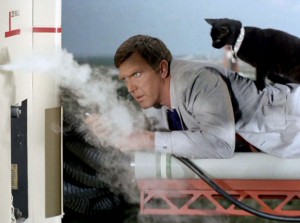 This was the cool factor for seven-year-old me. I loved that freakin’ rocket, and this Gary Seven guy was getting to climb up and touch one as it was about to launch. With a cat on his back! This was one of my favorite character moments, too. Seven understands every sound his cat, Isis, makes, just as if she were speaking to him. But, while they’re on the gantry, he responds to one of her cries with, “Meow? You are nervous, aren’t you?”
This was the cool factor for seven-year-old me. I loved that freakin’ rocket, and this Gary Seven guy was getting to climb up and touch one as it was about to launch. With a cat on his back! This was one of my favorite character moments, too. Seven understands every sound his cat, Isis, makes, just as if she were speaking to him. But, while they’re on the gantry, he responds to one of her cries with, “Meow? You are nervous, aren’t you?”
All the trappings of a space launch were in that episode, including stock shots of Mission Control in Houston and the stages of the Apollo rockets dropping to Earth. (The stock footage used in the episode was of Apollo 4’s Saturn V rocket, per Memory Alpha.)
Captain Kirk and the crew of the Enterprise, doing some historical research via time travel, discover Seven and… sort of… maybe try to interfere? Actually, Kirk and company don’t do a hell of a lot in this episode. It’s Gary Seven’s show, for the very good reason that, well, it was intended to launch Gary Seven’s show, Assignment: Earth. It’s called a back-door pilot. Producers make the first episode of a proposed new series, and then shove it into the middle of an episode of an existing series. Fans of the older series might then pick up on the newer series. Norman Lear was the king of this kind of thing, spinning Maude off All in the Family and Good Times off of Maude. In this case, though, the pilot had already been turned down when it was recut into a Trek episode.
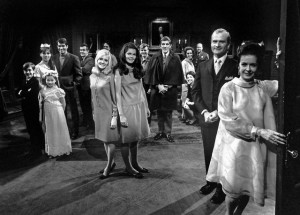
Art Wallace created most of the staple characters of Dark Shadows, but not, alas, the vampire, the witch or the werewolf.
“Assignment: Earth” was written by Art Wallace, a veteran writer who began his television career almost before there was television, working on anthology shows like Studio One and Kraft Television Theater. Wallace had also written the opening storyline for the phenomenally successful gothic soap opera Dark Shadows. After Trek, he would also contribute to the development of Space: 1999 and write its second episode, and serve as story editor for the soap All My Children. His brilliant character drama “Obsession” was one of the highlights of the original run of Star Trek.
The proposed series would have been the story of this intergalactic do-gooder who, week after week, interfered in Earth history and saved humanity from its own stupidity. Gary Seven was sort of the anti-Captain Kirk. Kirk, of course, was sworn not to interfere. As most Trek fans know, Captain Kirk sometimes managed to interfere despite it all. One wonders if his creator, Gene Roddenberry, might not have realized that the vaunted “Prime Directive,” which forbid Kirk’s interference in alien civilizations that had not achieved space flight, was a bit of a storytelling buzz-kill. What’s the point of having a cool starship, phasers, transporters and a closet-full of magic, tear-away shirts if you can’t kill a little alien ass and take a few alien names? Other than for your personal phone book, I mean?
Maybe it’s better if, with all that power, you go in and effect change so you can make things better. That seems to be the point of Assignment: Earth, the series that never was. Suppose there was an alien force that had all the answers and wanted only good for humanity. Suppose that force could send human agents into the field to do its good work, always confident that every action those agents undertook was the right one?
What would most people call that force? Three letters? Starts with ‘G?’ (Except in Latin where it’s four letters and starts with ‘D.’) But Roddenberry didn’t believe in God, so Gary Seven’s omniscient sponsors had no name. The principle is the same, however. Gary was on a mission from a higher power, and whatever he did was good and just. He was here to make sure that humanity’s technology didn’t destroy it while humans matured morally and socially.
Sounds good, right? Matching perfect morality with the power to get things done? We dream of knowing people like that, of being helped by people like that. I’ve heard Americans say, “We just need leaders who aren’t afraid, who do the right thing no matter what the law says. We need a President who can tell Congress to sit down and shut up while he saves the Country.”
Yeah. I’ve really heard people say that. Trouble is, there’s a name for a single leader with that kind of power, moral courage and determination. He’s called a dictator. And, sooner or later, he uses his power to do a lot of things that a lot of people don’t like.
And yet we still long for the leader who’s smarter than we are, stronger than we are, who has the courage to stand up and do the things we don’t have the courage to do. Being smarter, of course, he also knows where and when to act, and he can act behind the scenes. He doesn’t need to obey laws, because he’s always right. We don’t need to know what he’s doing, in fact, we probably shouldn’t. Because, as Americans, there are “some things we have a right not to know.”
Yep. I’ve had someone say those words to me too.
It’s a powerful fantasy, but we need to recognize it as that. A fantasy. Sure, there are people smarter than us, stronger than us, braver than us. But no one is perfect in any of those categories, and no one’s moral judgment can be trusted every single time. That’s why we have laws–not just because people will do things that they know are wrong, but because people will do wrong things and be dead-set convinced that they’re right. That’s especially true if those people believe they’re on a mission from God, or even from an extraterrestrial higher power who doesn’t use that code name. Who do you think the 9/11 bombers thought their orders came from? If you say “Osama Bin Laden,” you’re incorrect. Those murderous bastards thought they were on a mission from God.
Recently, a young woman from my adopted home county climbed a flag pole and took down a flag that offended her because the law wasn’t working fast enough to remove it. She was hailed by some as a great leader and a hero. She said she was on a mission from God. Okay, she just took down a flag. But do we really want to give people a pass to cheat the law and bypass our process? Because they’re on a mission from God, or just because they’re somehow “leaders?” Making the rest of us… what, exactly?
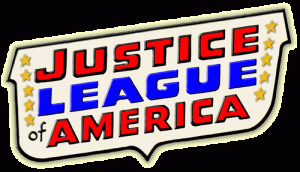 My brother, same guy who was brutally robbed of his Saturn V model, hated comic book super heroes. He used to refer to the Justice League of America as “The Junior League of Assholes.” Okay, it’s not clever. But his reason for hating them kinda was. He saw super-heroes as people with power who lorded it over others, and forced their brand of morality down the throats of those who were weaker.
My brother, same guy who was brutally robbed of his Saturn V model, hated comic book super heroes. He used to refer to the Justice League of America as “The Junior League of Assholes.” Okay, it’s not clever. But his reason for hating them kinda was. He saw super-heroes as people with power who lorded it over others, and forced their brand of morality down the throats of those who were weaker.
Kinda like Gary Seven.
I’m not saying Gary Seven’s a bad guy. If Assignment: Earth had been made, I would have watched it and probably enjoyed it. Indeed, I enjoyed both John Byrne’s comic book adventures of Gary Seven and Greg Cox’s development of the character in his “Eugenics Wars” novels. (Greg also wrote Assignment in Eternity about the character. I have yet to read that one.) I was glad my friends Howie Weinstein and Mike Friedman both remembered Seven when they wrote Trek for DC Comics back in the 1990s.
And I still love the JLA, no matter what you think it stands for.
I’m not saying that those who step outside their comfort zone and effect change are bad people. Mother Teresa. Gandhi. Jimmy Carter. I have no problem with people bringing a little kindness into a tired world.
I just think no one person should be allowed to decide what’s right or wrong, to break laws, to change the lives of countless people without their permission, and not answer for it simply because they claim some higher power inspires them. And I think the implications of trying to manipulate societies and people into something you recognize as right are huge.
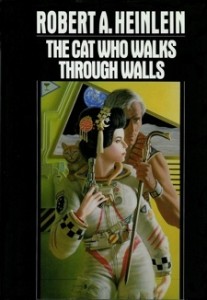 Robert A. Heinlein touched on this in one of his (sadly maligned by many) later novels, The Cat Who Walks Through Walls. In it, we learn that a whole passel of Heinlein heroes have gotten together to form the “Circle of Ouroboros.” This group attempts to change the courses of histories on multiple timelines, to make order out of chaos, in a multiverse where there are very definite “black hats” interested only in bringing trouble. Dr. Jubal Harshaw, the most autobiographical of Heinlein’s characters, reflects on the dangers of such manipulations:
Robert A. Heinlein touched on this in one of his (sadly maligned by many) later novels, The Cat Who Walks Through Walls. In it, we learn that a whole passel of Heinlein heroes have gotten together to form the “Circle of Ouroboros.” This group attempts to change the courses of histories on multiple timelines, to make order out of chaos, in a multiverse where there are very definite “black hats” interested only in bringing trouble. Dr. Jubal Harshaw, the most autobiographical of Heinlein’s characters, reflects on the dangers of such manipulations:
I come from a world identical with yours to about 1939… Both your world and mine showed a tendency toward religious hysteria. In mine it peaked with a television evangelist named Nehemiah Scudder… a religious dictatorship… as brutal as my world has ever seen.
So this Circle set up an operation to get rid of Nehemiah Scudder… A high school boy without a rubber was provided with one by a field operative, and the little bastard who became Nehemiah Scudder was never born… Bound to be better, right?
Wrong. In [that timeline]… a hundred years later it was still impossible to find any life superior to cockroaches on the land masses of what had once been the cool green hills of Earth.
The best laid plans of mice and men… To me, Heinlein’s example shows why we don’t need (and shouldn’t long for) an intergalactic nanny to come and break up our playground squabbles. Indeed, it’s a pretty insulting idea, when you get right down to it. It’s rooted in negative attitudes about humanity’s future. It’s anti-human, in fact. It discounts the good we’ve accomplished, and overlooks the fact that we actually do manage to solve a lot of problems on our own.
In fact, since the fantasy of otherworldly aliens coming to help can’t happen, what else is the moral theme of Assignment: Earth, other than that we should surrender power to a chosen few to “take care of us?”
It’s a theme that’s been on my mind lately, because, you see, I have at long last begun my third Arbiter Chronicles novel. It’s going to be a bit shorter than the last, and a bit more straightforward in its plot. But it’s all about one person taking it upon himself to make decisions that affect the lives of lots of other people. It’s one thing if those people have endorsed him to do so. It’s another if, well, he thinks there are things we have a right not to know. And that’s what the book’s about. Someone trying to prevent people from having knowledge that might be dangerous.
I still freakin’ love that rocket. Should I buy my brother a new one, all these years later?
Or should I just say I took it on a mission from God?

